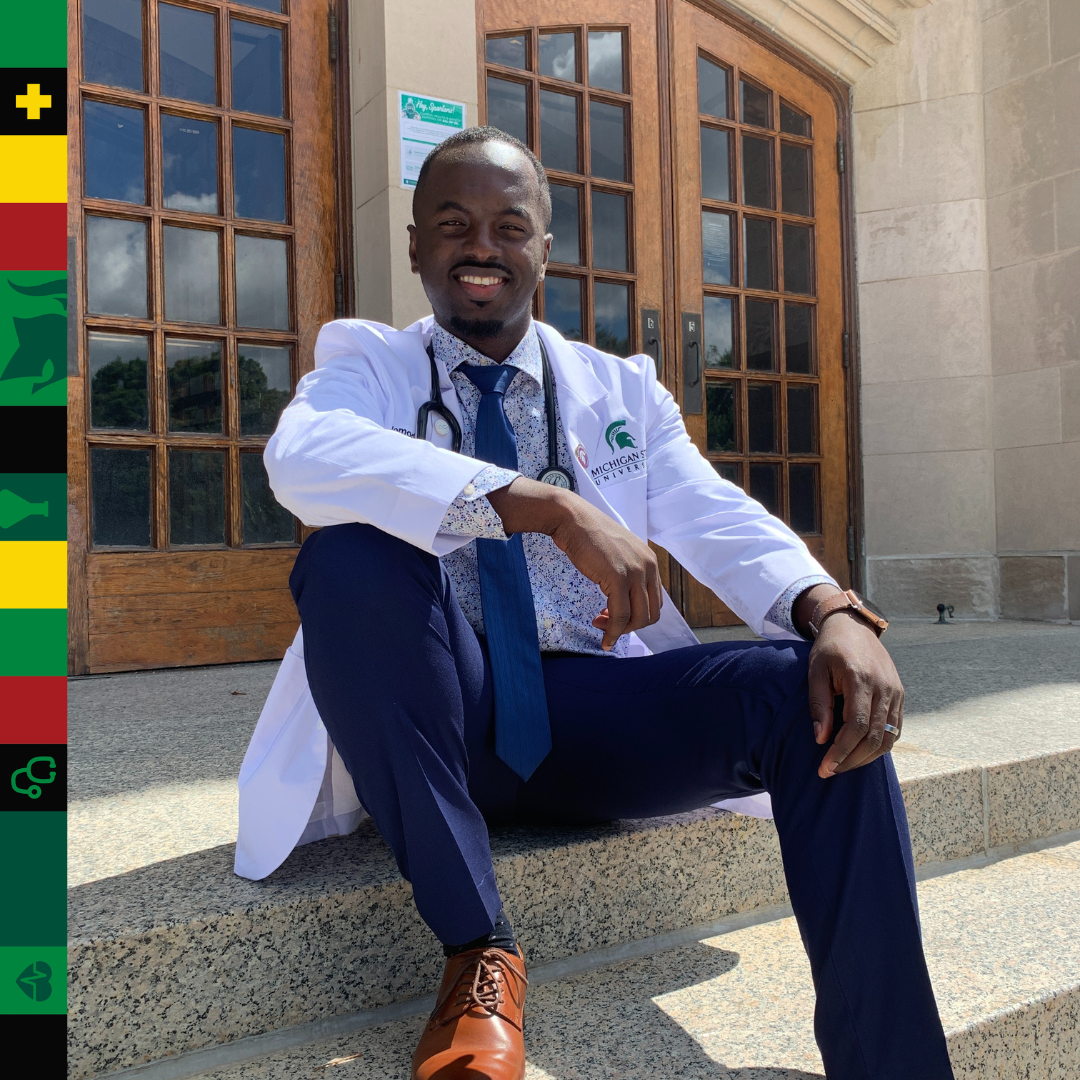Celebrating Black History Month
February 26, 2024
Join us in celebrating Black excellence in medicine! We are highlighting the voices, experiences and achievements of several Black students in the College of Human Medicine.

Momodou G. Bah
Motivated by a desire to improve health care in his home country, The Gambia, third-year student Momodou G. Bah (Gobi) has chosen to pursue a career in neurosurgery. His determination holds significant weight in a country where over two million people depend on a single neurosurgeon. Gobi is already making an impact by collaborating with Dr. Jabang, The Gambia's only neurosurgeon, to lay a solid foundation for research in the neurosurgery department.
As a proud Black medical student, Gobi recognizes the importance of diversity in health care. He sees its role in building patient trust and improving health outcomes. "There's a pressing need for more Black and minority doctors," he states. "As a former patient, I know the reassurance that comes from seeing people who look like me in my healthcare team.”
His message to other aspiring Black medical students: "Don't give up on your dreams. You’re more than capable of becoming a physician. Reach out and ask questions. I believe in the power of networking and there are a lot of people in the field who are happy to mentor and guide students, including me.”
Georgina Brown-Steplitus
Following a life-threatening emergency her mother experienced during childbirth, second-year student Georgina Brown-Steplitus developed a deep passion for medicine, specifically women's health. She aims to prevent such distressing situations in the future. Georgina is a Jamaican immigrant who is currently pursuing an MD and a PhD in Genetics and Genome Science. "I aspire to become a physician-scientist, leveraging my expertise in medicine and research to improve the future for vulnerable populations."
When asked what being Black in medicine means to her, she had this to say: “It is a profound honor to recognize that, despite the obstacles we encounter, we can triumph over them and secure our place in the field of medicine. Coming from a background where my parents couldn't attend high school due to financial limitations, the prospect of attending medical school seemed like an unattainable dream. However, I transformed that dream into a reality through unwavering dedication and perseverance."
Elizabeth-Victoria Shokoya
From a young age, Elizabeth-Victoria Shokoya’s curiosity about the human body was sparked, alongside a growing awareness of the inequalities in health care access. A pivotal moment came for her when a family member was denied care due to insurance, fueling her determination to become a physician who advocates for vulnerable communities.
"As a young Black child, there were few role models who weren't athletes or entertainers. I could count on both hands the number of doctors I encountered who looked like me. I knew I wanted to be a physician, but the lack of examples made it seem impossible, especially growing up in a low-income household.”
Today, she is on her path to becoming a neurosurgeon, a field with few Black doctors. "When observing neurosurgeons at a hospital that served a large black population, I felt like I was in the right place when the patients who looked like me would smile when I walked in the room.”
Elizabeth’s leadership skills and dedication led her to be elected as co-president of the college’s East Lansing Student National Medical Association (SNMA) chapter.
Looking forward, Elizabeth aims to work in underserved communities and continue advocating for increased representation in the medical field. “I want to mentor the next generation of medical professionals so that they feel supported and feel like they belong in the field.”
Nathan Hankerson
Recognizing the strained relationship between Black communities and the health care system, Nathan Hankerson saw an opportunity to bridge this divide by going to medical school. “It is my mission to ensure that the Black community feels they can rely on my treatment as a physician by cultivating an inclusive and safe atmosphere for medical discussion.”
Among Nathan's accomplishments during medical school is his role as the Co-Pipeline Program Chair for the Student National Medical Association (SNMA), having organized two Reach Out to Youth events to encourage children to follow into a career in health care. Nathan aspires to work in orthopedics or physical medicine/rehabilitation with a focus on sports medicine.
Nathan offers heartfelt advice to fellow Black students pursuing a career in medicine: “Recognize your worth and capabilities, and above all, stay resilient. Setbacks may happen, but thinking back to the moments that inspired you to pursue a career in medicine should always serve as an anchor in your journey.”





